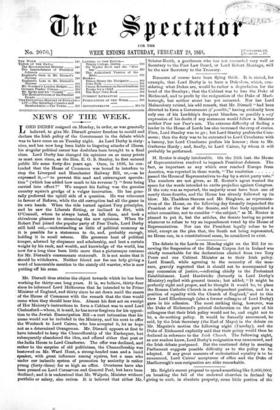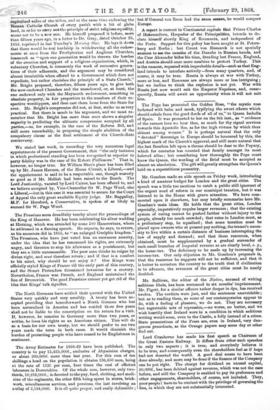Mr. Bright's recent proposal to spend something like 3,000,0001. on
breaking the fall of the endowed churches in Ireland by giving to each, in absolute property, some little portion of the capitalized value of the tithes, and at the same time endowing the Roman Catholic Church of every parish with a bit of glebe land, in order to carry out the principle of strict religious equality, seems not to be a new one. He himself proposed it before, more than fifteen years ago, in a letter to Dr. Gray, dated October 25, 1852, reprinted in last Tuesday's Morning Star. He lays it down that there would be real hardship in withdrawing all the endow- ments at once from the Presbyterian and Anglican Churches, inasmuch as " upon one generation would be thrown the burden of the creation and support of a religious organization, which, in voluntary Churches, is commonly the work of successive genera- tions of their adherents, and the argument may be considered almost irresistible when offered to a Government which does not repudiate, but rather cherishes the principle of a State Church." Mr. Bright proposed, therefore, fifteen years ago, to give both the now-endowed Churches and the unendowed, or, at least, the one endowed only with the Maynooth endowment, something in absolute property, in fair proportion to the numbers of their re- spective worshippers, and then cast them loose from the State for ever. Mr. Bright's compromise did not, at first, strike us as very practical. But there is much in his argument, and we must re- member that Mr. Bright has more than once shown a singular sagacity in predicting the ultimate compromise accepted by all parties,—as, for example, in the case of the Reform Bill, and still more remarkably, in proposing the simple abolition of the compulsory clause as the final settlement of the Church-Rate controversy.































 Previous page
Previous page